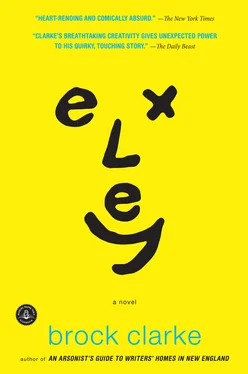“It’s all true, you know,” he said. He’d put on a collared blue corduroy shirt and had wiped off the shaving cream; his beard looked wet and flat, like grass in the morning after an animal has slept on it. He pointed down at his notes. “It’s all true. Every word.”
Like a lot of people who tell the truth, Dr. Pahnee sounded like he wanted to be congratulated for telling it. “Congratulations,” I said.
“It’s all true as far as it goes,” he said. “But it doesn’t go far enough. I need you to tell me the rest of it.”
“I don’t think I can do that,” I said.
Dr. Pahnee took the notes away from me, walked around his desk, sat down, and opened the book to a blank page. Then he picked up a pen. “Sure, you can,” he said. “We’ll do it together. I’ll ask questions, and you answer. Your answers can be as complicated as they need to be, but I’ll keep my questions as simple as I can. You talk and I’ll write.”
Doctor’s Notes (Interview with M.)
Q: Did you really teach your father’s class at Jefferson County Community College?
A: No.
Q: Did your father really teach at Jefferson County Community College?
A: No. He said he did, but when I went to the registrar’s office, they said he wasn’t teaching a class that semester and had never taught a class.
Q: So you found an empty class and pretended to teach his class?
A: Yes.
Q: And you pretended you had students, too.
A: Yes.
Q: And you pretended K. was one of your students.
A: Yes.
Q: Have you ever met K.?
A: No. ( Long pause .) Not that I know of.
Q: But you assume she is real.
A: Yes. Because both Mother and my dad mentioned her name.
Q: Your father said she was his student.
A: Yes.
Q: Except he didn’t have any students.
A: Yes. I mean, no, he didn’t have any students.
Q: So who do you assume she was?
A: ( Silence .)
Q: What kind of relationship do you think your father and this K. had?
A: ( Silence .)
Q: Where do you assume your father was when he was supposed to be teaching his class?
A: ( Silence .)
Q: Do you assume your father and this K. had an extramarital affair?
A: My dad wouldn’t do something like that.
Q: Exley would have done something like that.
A: ( Silence .)
Q: You did something like that in your head. Why?
A: If I was with K. in my head, then I thought I wouldn’t be able to picture her with my dad in real life. It worked, too, at least for a little while.
Q: If your father and this K. didn’t have an affair, what do you think they had?
A: ( Long pause .) I don’t know.
Q: Do you think your father’s joining the army and going to Iraq had something to do with K.?
A: I told you I don’t know.
Q: Do you think your mother found out about K. and kicked him out and that’s why your dad joined the army and went to Iraq?
A: ( Long pause .) Yes, I think that might be part of the reason.
Q: What’s the other part?
A: The other part also happened on the twentieth of March, 200–.
Q: The day your dad left to go to Iraq?
A: Yes. I’d come home from school. It was the last day of school before spring break, like I told you. Mother was in the driveway, crying. But my dad wasn’t in his car yet. He was standing in the driveway with her. And I wasn’t hiding behind the bushes. I was just walking down the sidewalk. But you know all that from reading my journal.
Q: ( Long pause .) I’m sorry. I shouldn’t have done that. But why did you lie to me about hiding behind the bushes in the first place?
A: Because I didn’t want to be in the story. Because I didn’t want to admit I had anything to do with anything.
Q: But you did.
A: As I turned into the driveway, I could hear my dad say, “Poor K.” At first I thought my dad was saying the Spanish word for “because.” I’d just learned that word in my Spanish 1 class. Except my dad didn’t know any Spanish. That’s when I realized what he was saying, and I also realized, since I knew my dad liked to refer to some people by their first initial, because Exley did, that K. was probably the first letter of someone’s first name, and not the name itself. But I didn’t know who K. was, and I didn’t know why my dad said “Poor K.” like he did: like he wasn’t really sorry for K., whoever K. was.
“Who’s K.?” I asked. Neither of them had noticed me until then. When they heard my voice, they both turned to look at me. But they didn’t say anything. There was a weird feeling around all of us, like something was missing in the air. It was like the feeling you get right before or after a thunderstorm, or the feeling you get when someone’s just been talking about you. Except my dad and Mother hadn’t been talking about me. They’d been talking about K. Or at least my dad had been. “Who is K.?” I asked again.
Mother looked away from me and at my dad. At first I thought I recognized the look, because I’d seen it so often: she was angry at him. And then the look changed, like she was about to cry again. And then that look changed again, like she was asking my dad a really big favor. It was a complicated look. I remember thinking that, and I also remember thinking that you had to have known someone for a really long time to be able to look at him like that, and he had to have known you for a really long time to be able to understand it.
“K. is one of my students at the college,” my dad finally said. He said it to Mother, not to me. Mother smiled and then started laughing, but the laugh was dry, more like a cough than a laugh, like Mother didn’t exactly think what my dad had said was funny. And sure enough, then she started crying again. Before Mother started crying, my dad had taken a few steps toward his car; after she started crying, my dad stopped walking and looked back at Mother, like he didn’t want to keep walking and wouldn’t keep walking if someone gave him a good reason not to. That’s when I pulled my report card out of my backpack. I always got good report cards, and they always made my dad happy. Anyway, I gave him my report card. I hadn’t opened it before I got home because they always told you not to. My dad opened the envelope, took out the report card, read it, and then said, “Oh, buddy.” Mother took the report card from my dad and read it and said, “Shit, Tom.”
“It’s not my fault,” my dad said.
“It is your fault,” Mother said. “You’re going to turn M. into someone just like you if you’re not careful.”
“Funny,” my dad said. “That sounds like something K. would probably say.”
Mother went thin lipped and didn’t answer. I took the report card from her and read it. I looked at the grades first. They were all As. Then I looked at the space they leave for teachers’ comments. Only one teacher wrote anything. That was Ms. W., my English teacher, and she wrote, “M. certainly is a smart one. And a hard worker! For instance, for our America on the Same Page book, he wrote two book reports: one for the book itself, and one for a book called A Fan’s Notes , in which he argues (in great detail!) why that book is better than the America on the Same Page book. I’ve never read this A Fan’s Notes , but it certainly sounds interesting!”
When I was done reading what Ms. W. had written, I looked up. My dad was in his car, and the car was running. “It’s OK, bud,” he said to me. “It’s not your fault.” And then to Mother: “Maybe I should go to Iraq, too.” And that’s when Mother said, “Please ,” and then my dad drove away and then Mother told me wherever my dad was going, it wasn’t Iraq.
Читать дальше












